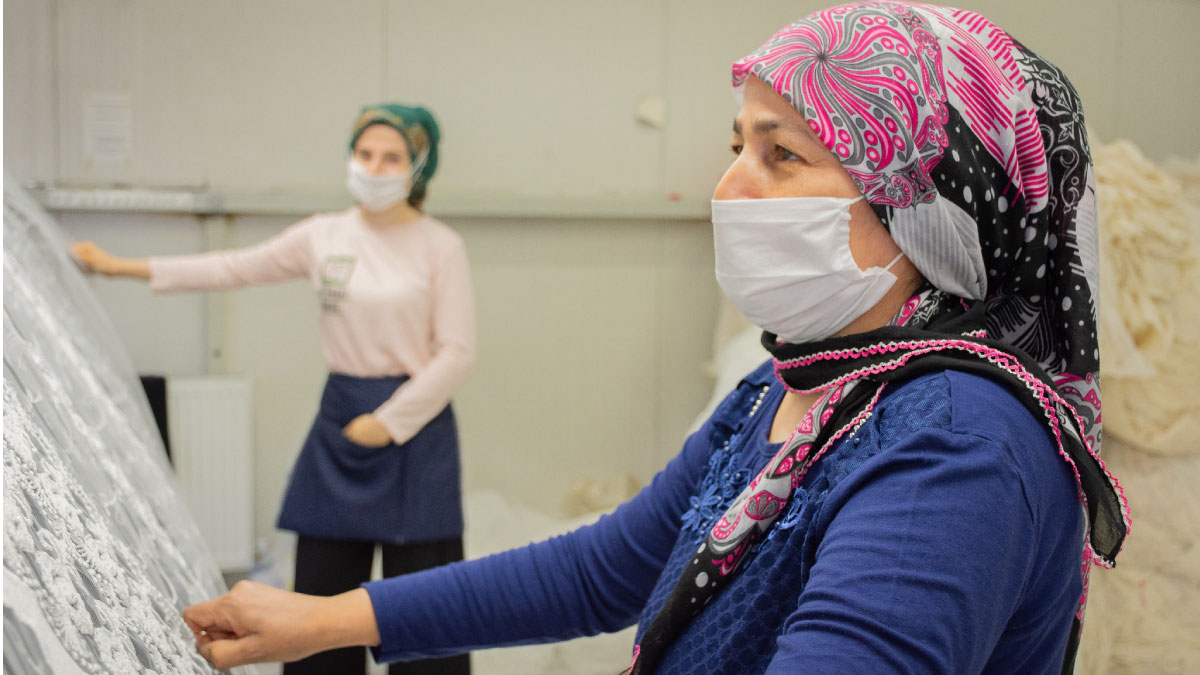Following the first World Trade Congress on Gender, Mr. Moreno discusses how trade policy could make crisis response and recovery more inclusive.
© International Labour Organization | Women textile workers perform quality control tests in İzmir, Turkey during the COVID-19 pandemic.
From pandemics to recessions, crises hit men and women differently. And the effects, from cuts in public spending to job loss, tend to hit women harder.
The first World Trade Congress on Gender, held from 5 to 7 December at the World Trade Organization (WTO), brought together researchers, policymakers and leaders from businesses and international organizations to examine how trade policy could make crisis response and recovery more inclusive.
During the high-level opening session, UNCTAD Deputy Secretary-General Pedro Manuel Moreno highlighted the need to increase the number of winners of trade and that women must be at the table when policy measures are discussed and decided. While this may seem evident, it is still too often not a reality.
Following the event, Mr. Moreno discussed some of the key points.
Q: Why are crises not gender neutral?
There are several reasons why crises tend to disproportionately affect women and girls.
Women’s labour market participation differs from that of men. Relatively more women than men work in the informal sector and have temporary or less stable work contracts. This implies that they benefit less from social protection and are thus more vulnerable. It also means women are more likely to lose their jobs in times of spending cuts.
Among business owners, women have less access to finance and thus fewer means to enable their businesses to survive and prosper.
In crises, girls are at higher risk to be taken out of school to compensate for income loss or take up care responsibilities. This has very strong negative long-term effects.
And crises are associated with an increase in gender-based violence, which is a particularly ugly face of crises.
The COVID-19 and cost-of-living crises are no exception.
During the pandemic, around 4.2% of women and 3% of men lost their jobs, according to the International Labour Organization. Many women left the labour market altogether as they took up a disproportionate share of care responsibilities. This resulted in a reversal of hard-won gains on women’s empowerment and gender equality.
UNCTAD’s work within the Global Crisis Response Group – which was established by the United Nations Secretary-General in the wake of the war in Ukraine – also brought the gender dimension to the fore.
The work showed that gender gaps widened especially by increasing women and girl’s rates of food insecurity, malnutrition and energy poverty.
Q: What role can trade policy play in ensuring recovery efforts also benefit women?
Trade plays an important role in crisis recovery. The food, fertilizer and energy crises and the COVID-19 crisis have been clear reminders of how integrated our societies are, and how important global supply chains are for our societies to function and prosper.
But we not only need trade to recover, we need it to recover in a more inclusive manner. This means that we need to broaden the number of "winners", which in turn means we need to ensure that trade includes and benefits more women, and that the distributional effects of trade are fairer.
This requires gender-sensitive policies at the national, regional and international level.
Q: Any examples of policies making trade or its effects more inclusive?
I would like to highlight three examples.
The first example relates to trade agreements and thus trade policymaking.
There is increasing visibility and recognition of gender issues in trade agreements. The 2016 Free Trade Agreement (FTA) between Chile and Uruguay was the first FTA to include a gender chapter. Today more than 80 regional and bilateral trade agreements include at least one provision mentioning explicitly gender or women. But the ways in which gender issues have been incorporated in agreements vary and we must monitor their implementation and ensure accountability. But we are on the right track.
The second example is how policies and practices of multinational enterprises affect gender equality in host countries. As most trade happens through multinationals, their policies matter. Our research shows that multinational enterprises affect gender equality in host countries directly, through employment practices in foreign affiliates, such as non-discrimination policies for equality in hiring practices. There is also an indirect effect through “spillovers” to local labour markets.
The third example is voluntary sustainability standards (VSS), which can help align trade with various sustainability criteria. They can improve employment and working conditions—for example, by requiring compliance with equal wage criteria to receive certification. This can be particularly beneficial to women workers, who are disproportionately crowded into casual and temporary jobs, where lower wages and precarious conditions are more common.
Q: How important are multilateral trade rules?
Gender inequality is one of the oldest inequalities.
Changing norms and stereotypes is a long process. To succeed, we must also see commitment for making trade more inclusive at the global – which means multilateral – level.
At the WTO, some remarkable steps have been taken on women in trade. At MC 11 in Buenos Aires in 2017, for the first time, gender equality issues were discussed at a high-level meeting dealing with trade policy. This resulted in the Joint Declaration on Trade and Women’s Economic Empowerment.
Also setting up the Informal Working Group on Trade and Gender in 2021 was another important step.
And this first World Trade Congress on Gender goes in the same direction. It provides a much-needed opportunity for researchers to share their knowledge and findings directly with policymakers. And for policymakers, it is the occasion to highlight the data and analysis they need in support of gender-responsive policymaking.
With more sustainable and inclusive trade we are preparing for the future. And this is much needed as without decisive action, it may take another 300 years to achieve gender equality.

